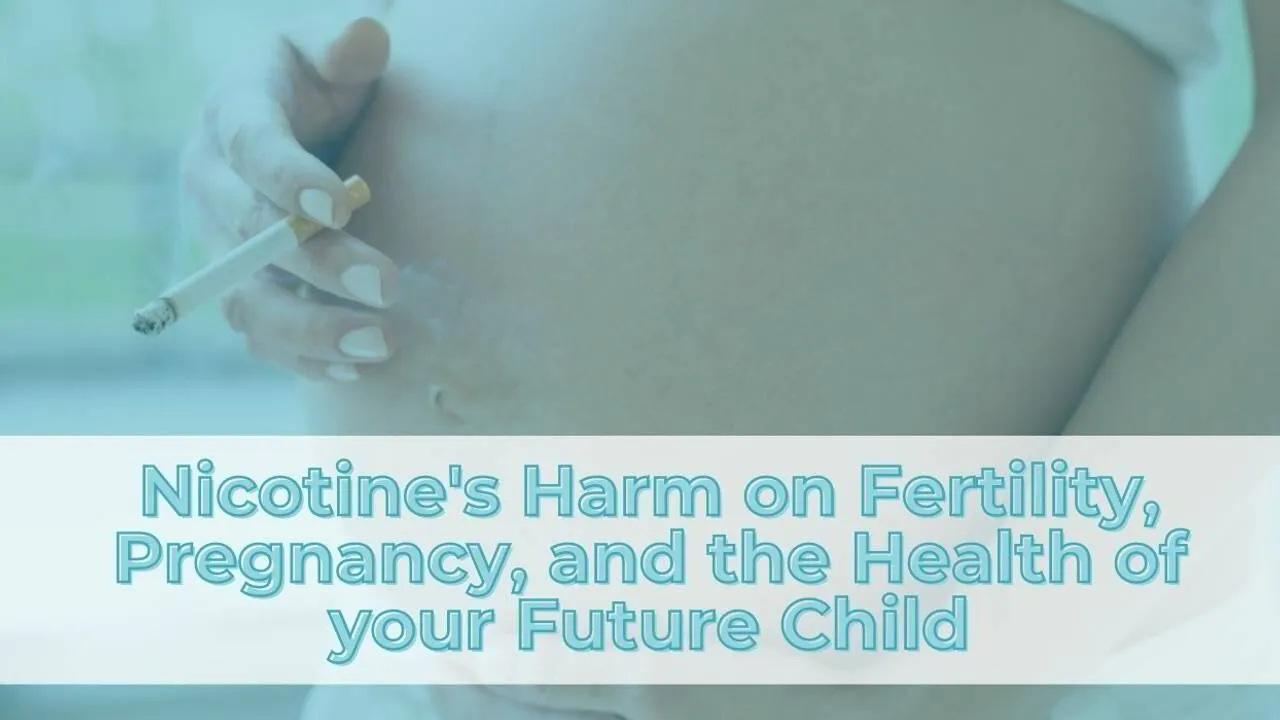It doesn't come as news that cigarette and nicotine negatively affect fertility or health of future babies. But... there are a surprising number of couples that ask me for the research behind this. Well.... there are actually close to 7000 studies on this topic. But here are some of my favorites!
Cigarette smoking is not only a potent cause of lung cancer but also has been associated with low birth weight, preterm delivery and abortion in women who are addicted to it. It also causes menstrual irregularities, pregnancy complications, and decreased fertility in women. Moreover, cigarette smoking inhibits spermatogenesis and causes decreased steroidogenesis in men. PMID: 23926503
Cigarette smoking has also been shown to have anti-estrogenic effects in women. In males, the effects of smoking on androgen is important, given the recent interest in the association between low androgen levels, the metabolic syndrome and coronary heart disease. Other adverse effects of smoking include premature ejaculation and reduced penile erection; however, these depend on individual sensitivity or susceptibility. PMID: 23926503
Smoking and Sperm Quality:
Cigarette smoking among men can affect spermatogenesis and sperm quality through hormonal and toxic influences. In a review of the literature on male reproduction and smoking, noted that the cytotoxic effects of exposures to tobacco smoke may reduce the numbers and function of sperm, or may affect male reproductive hormone levels and lead to impairment of spermatogenesis. Although the results of studies supporting the latter mechanism are mixed, several studies have found that levels of testosterone, estradiol, estrone, androstenedione, and follicle-stimulating hormone are increased among smokers compared with nonsmokers, while other studies have found decreases among smokers compared with nonsmokers or no differences between the two groups. https://www.ncbi.nlm.nih.gov/books/NBK44697/
Smoking and Female Fertility:
Numerous studies have shown that smoking results in reduced fertility and fecundity for couples with one or both partners who smoke. Fertility might be reduced by active smoking through numerous mechanisms. Animal studies suggest that prenatal exposure to polycyclic aromatic hydrocarbons has a destructive effect on oocytes and may affect the release of gonadotropins, corpora lutea formation, gamete interaction, and implantation. Studies in rats and humans also have shown that postfertilization cleavage is delayed in smokers. https://www.ncbi.nlm.nih.gov/books/NBK44697/
Smoking during pregnancy causes adverse health outcomes that can affect women and infants during and after pregnancy.
It increases the likelihood of pregnancy complications such as
- placenta previa
- placental abruption
- miscarriage
- preterm birth
- premature membrane rupture.
Infants born to women who smoke are at higher risk for.
- Low birthweight (LBW)
- Stillbirth
- Infant death (sudden infant death syndrome, or SIDS)
- May be at risk of orofacial clefts (ie, cleft lip with or without cleft palate and cleft palate alone).
Women of childbearing age who smoke are also at higher risk of conception delay and infertility. Despite these risks, according to US Pregnancy Risk Assessment Monitoring System data from 27 sites in 2010, 23% of US women smoked in the 3 months before pregnancy and almost 11% smoked during the last trimester of pregnancy.
PMID: 24933145
Exposure to smoke or tobacco in other forms during pregnancy is associated with an increased risk of obstetric complications and adverse health outcomes for children exposed in-utero. Smoking during pregnancy poses substantial risk to mother's and child's health. PMID: 32204415
Smoking cigarettes can cause cervical cancer. This type of cancer occurs in the cervix, the lower, narrow end of the uterus that forms a canal between the uterus and vagina. Smoking interferes in the increase of HPV infection prevalence and in an increased risk of CIN and cervical carcinoma. Risk also increases with more cigars smoked per day. PMID: 26775350
Cigarette smoke is a reproductive hazard associated with pre-mature reproductive senescence and reduced clinical pregnancy rates in female smokers. Despite an increased awareness of the adverse effects of cigarette smoke exposure on systemic health, many women remain unaware of the adverse effects of cigarette smoke on female fertility. Cigarette smoke exposure caused increased levels of primordial follicle depletion, antral follicle oocyte apoptosis and oxidative stress in exposed ovaries, resulting in fewer follicles available for ovulation. Evidence of oxidative stress also persisted in ovulated oocytes which escaped destruction, with increased levels of mitochondrial ROS and lipid peroxidation resulting in reduced fertilization potential. Microarray analysis of ovarian tissue correlated these insults with a complex mechanism of ovotoxicity involving genes associated with detoxification, inflammation, follicular activation, immune cell mediated apoptosis and membrane organization. PMID: 23693141
Nicotine Impacts Your Biological Clock
It is well known that tobacco and cigarette smoke (CS) induces oxidative stress and consequently leads to excessive pulmonary inflammation in the pathogenesis of chronic obstructive pulmonary disease (COPD) and emphysema. Cigarette Smoking exposure differentially affected the amplitude and phase of circadian clock gene expression in the lungs and brain. PMID: 24025728
Quitting smoking can give you not only a healthy fertility optimization but can also make you be a healthy person overall. Diet and lifestyle shifts may be difficult, but it will be worth it, especially if you are willing to make these changes in preparing yourself to be getting pregnant and being the healthy parent, your child needed. Ceasing to smoke will double the chances of getting pregnant for both men and women.
According to the Theory of Reasoned Action, increased knowledge of adverse outcomes can influence attitudes and beliefs about behaviors; in turn, increased knowledge about health outcomes can influence attitudes, which can increase women’s intention to quit smoking before or during pregnancy. PMID: 24933145

